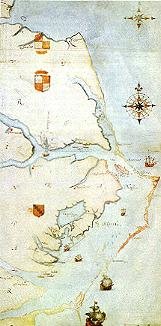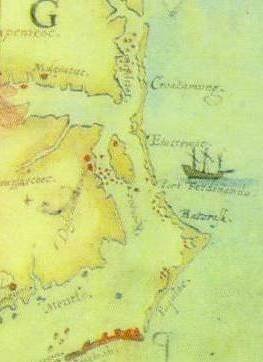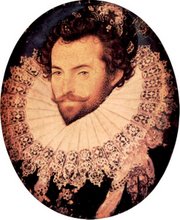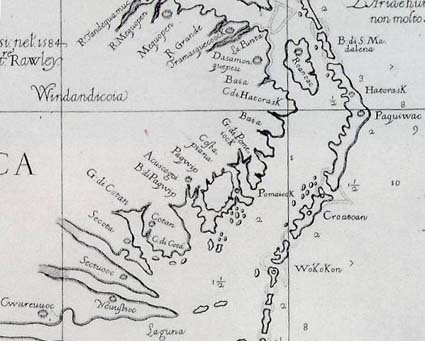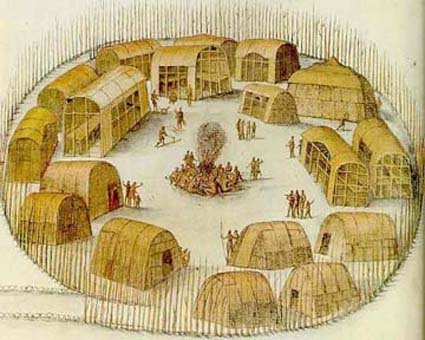Priscilla: The story of an African slave
|
| |||
Cont:
http://news.bbc.co.uk/2/hi/africa/4460964.stm
This blog is © History Chasers
Click here to view all recent Lost Colony Research Group Blog posts
~ History ~ Genealogy ~ Archaeology ~
Priscilla: The story of an African slave
|
| |||
Posted by
Historical Melungeons
at
2/17/2012 04:27:00 PM
![]()
Labels: africa, Genealogy, Sierra Leone, slave, South Carolina
http://www.nbc.ancestry.com/sweeps
Posted by
Historical Melungeons
at
2/03/2011 10:47:00 PM
![]()
Posted by
Historical Melungeons
at
1/31/2011 06:17:00 PM
![]()
Posted by
Historical Melungeons
at
10/29/2010 08:00:00 AM
![]()
Labels: DNA, Eastern, Genealogy, indians, Native American, Seaboard
Posted by
Historical Melungeons
at
10/23/2010 08:18:00 AM
![]()
Labels: family history month, Genealogy
"A blog can certainly be used to plan a research project and to document progress. The added benefit when traveling to research facilities is that these blogged research notes can be accessed through any computer with internet access. "
Posted by
Historical Melungeons
at
9/11/2010 11:18:00 PM
![]()
Four years ago, Lisa Kudrow was in Ireland filming P.S. I Love You when she saw the TV show Who Do You Think You Are? in which celebrities trace their ancestors.
Olympic hurdler Colin Jackson was tracing his family history back to Jamaica and Panama.
'Even though I'd never seen the show before, I was hooked,' she says.
'I watched more episodes and the stories were riveting. I wondered if we could do a show like this in the States.'
New friend: Lisa Kudrow discovered her Polish relatives and their tragic history and plans to take her husband and 11-year-old son to meet them
Her idea took off - next week, the U.S. begins screening its version, which promises to be as fascinating as the Bafta-nominated BBC series.
'When we started looking for celebrities, plenty were interested, but weren't sure they had an interesting background,' says Lisa, best-known as Phoebe Buffay in Friends.
'Sarah Jessica Parker was intrigued, but said: "Good luck - you won't find anything." '
Yet the programme not only discovered she had an ancestor who participated in the famed 19th-century California Gold Rush, but another was accused of witchcraft in the 1692 Salem witch trials.
Her husband Matthew Broderick, another of the show's subjects, found that his grandfather was a 22-year-old medic in World War I who had to tend to soldiers in the thick of the action. He was wounded and awarded the Purple Heart.
Broderick says: 'And I'd always thought of him as Joe the postman.'
Susan Sarandon learned her maternal grandmother had been pregnant and married by the time she was 13 and bigamy is hinted at, too.
But perhaps most astonishingly, Brooke Shields is descended from French royalty.
Having believed her family was descended from Italian aristocracy (one ancestor was the banker to the Vatican), she was stunned at being directly descended from Henry IV of France, with Louis XIV a cousin many generations removed.
Despite thinking she had an Italian heritage, when she was growing up, Brooke was always interested in French culture and studied French literature at university.
'She wondered if her lineage had some bearing on that,' says Lisa. 'It's those tiny, weird little connections to the past that make the show so interesting.'
Brooke also learned why her grandmother, Teresa, seemed so 'bitter, sad and afraid' and treated Brooke's mother, Teri, badly - researchers discovered Teresa had lost her own mother at the age of ten.
Having become the mother figure to her siblings, Teresa lost a brother in a drowning accident. The grief took its toll and Brooke's mother ended up running away.
Teresa's grievance towards her daughter may have been unfair, but Brooke now understands her grandmother better after piecing together her tragic life.
Lisa herself makes a journey to eastern Europe to uncover a story horribly familiar to Jewish families who lived through World War II.
You can read about it here:
Posted by
Historical Melungeons
at
3/01/2010 01:22:00 PM
![]()
Labels: celebrities, Genealogy, lisa ludrow, SARAH JESSICA PARKER, wdytya
The second episode in the Faces of America series airs Wed. night, February 17th on PBS.
Posted by
Historical Melungeons
at
2/17/2010 12:00:00 AM
![]()
Labels: DNA, faces of america, Genealogy
13th annual Angelina College Genealogy Conference in Lufkin, Texas.
July 16-17-18, 2009. http://www.angelina.edu/genealogy.htm
SPECIAL SATURDAY PROGRAMS.
Three special all-day sessions are offered as part of the full 3-day program -
OR you can register for "Saturday only" for either of the following. Note the
registration information; watch those dates .. No door registrations for the following.
1) DNA. If you'd like to know more, and possibly begin a Family DNA Study, this session is for you. The preliminary plan is that the 37-marker Y-DNA test will be reduced from $149 to $119 for the Angelina Conference. You will be able to purchase the DNA Kit at the conference. http://www.angelina.edu/genealogy.htm
2) CEMETERIES. If you have a family cemetery or are working to restore and preserve a church or community cemetery, this session will give you what you need to do it properly. Presented by the Texas Historical Commission, you will also learn how to apply for the official designation of Historic Texas Cemetery.
We'll also discuss genealogical research within & without the cemetery gate.
Note: There is no Saturday only registration for anything other than the two listed above. The two above may also be substituted for the multi-track Sat sessions at no extra cost with your full registration.
3) SEAT OF JUSTICE (courthouse research). John Sellers. This is *not* available as a Saturday only registration but you may substitute for the multi-track Sat sessions at no extra cost with your full registration.
13th annual Angelina College Genealogy Conference in Lufkin, Texas.
July 16-17-18, 2009. http://www.angelina.edu/genealogy.htm
Questions? Contact
Trevia Wooster Beverly
Houston, Texas
713.864-6862
treviawbeverly@comcast.net
http://www.angelina.edu/genealogy.htm
http://baytownhistory.org/
List admin Sue Skay Abruscato sueskay@gmail.com
Click here to view all recent Historical Melungeons Blog posts
© History Chasers
Click here to view all recent Searching for the Lost Colony DNA Blog posts
Posted by
Historical Melungeons
at
5/19/2009 02:32:00 PM
![]()
Labels: conference, DNA, Genealogy, lufkin
I have been lecturing recently on the topic of “Oral History for the Genealogist.” When I get the opportunity, I like to ask my audience to give me their definition for “oral history.” I explain that lexicographers (dictionary compilers) generally create definitions from how the word is used in speech and writing. So, I tell the audience, they either can offer up a dictionary-like definition or give me an example of a genealogist, like themselves, engaging in “family oral history.” In social science research, this kind of definition is called an operational definition. Whether or not formally stated (such as in my little exercise), operational definitions greatly influence how we interpret our sources and our data.
I have received a variety of definitions, one which I want to discuss here. This definition is simply stated as: “Oral history is what you get from family when you ask them to tell you about your ancestors. It helps you find records.” What is interesting about this definition is the embedded assumption that family “oral history” is part of your early research, but has little additional value as your research matures into looking at written records.
I hope to correct a misconception about the “starting with family” advice given to most beginner genealogists. It’s not that I disagree with that advice. I support approaching family early in your research. However, the manner in which this advice is communicated suggests that once you have visited mom, Grandpa Jones or Aunt Mayzie—once you’ve gotten elders tell you the names and vitals of all the ancestors that they can recall—you can contentedly consign your living relatives back to holiday visits and the periodic phone call to catch up on current events. The fact that they might know more about the family genealogy than they initially provided just does not get the attention that I am convinced is warranted.
Cont. here:
Posted by
Historical Melungeons
at
2/14/2009 10:04:00 PM
![]()
Labels: Genealogy, oral history
Dear Myrtle's Organization Check List for February
I love her comment: " Maybe we should all be committed!"
You can print out this pdf file, but Myrtle recommends viewing online. So the hyperlinks work.
http://www.dearmyrtle.com/09/2009FebruaryOrganizationChecklist.pdf
© History Chasers
Click here to view all recent Searching for the Lost Colony DNA Blog posts
Posted by
Historical Melungeons
at
2/06/2009 07:25:00 PM
![]()
Labels: Dear Myrtle, Genealogy, organization
Thanks to Joy King for the following:
From Eastman's Online Genealogy Newsletter 7/13/08
http://www.usa.gov/Citizen/Topics/History_Family/State_Genealogy.shtml
Has URLs for the Archives of every state.
Posted by
Historical Melungeons
at
7/13/2008 11:19:00 AM
![]()
Labels: free resources, Genealogy, Genealogy archives, state resources
Posted by
Historical Melungeons
at
7/04/2008 08:43:00 AM
![]()
Labels: death certificates, Free, Genealogy, texas
A genealogy blog? What's that?
A “blog” is one of those made up words coined by the Internet.
Click here to see the Wikipedia definition.
Click here to visit the GenealogyBank.
Here are some blogs that come highly recommend. They are each must read sites.
Ancestry Insider
This well informed blogger’s daily posts are focused on Ancestry.com and familysearch.org Knowledgeable and on target it is a must read blog written by an Ancestry employee – BUT it is not an “official” corporate blog.
DearMYRTLE’s Genealogy Blog
DearMYRTLE has been working in genealogy for decades. Her blog is essential reading and can be counted on for breaking news and insight. Count on her to make new resources easy to use and understand.
Eastman’s Online Genealogy Newsletter
Dick Eastman’s blog is essential reading. Dick is up to date and knows the field. His blog comes in two flavors – free and a paid version. You’ll want to pay the nominal fee and subscribe to his blog - it’s worth it.
Everton Publisher’s Genealogy Blog
Leland Meitzler posts 3-4 times a week and puts his decades of experience to work in reporting what is happening in genealogy. Leland has the pulse of the field and hey, he’s a heck of a nice guy too.
The Footnote Blog
This blogger usually posts 2-3 times a month. The articles are usually brief and focus on the latest developments at Footnote.com – you’ll want to read it to keep up with what’s new on that site.
Genealogy Insider
Diane Haddad, Editor of Family Tree Magazine is a great blogger. Well informed and with an upbeat writing style. Haddad is essential reading. Don’t miss this blog – its terrific.
http://blog.genealogybank.com/
Posted by
Historical Melungeons
at
6/21/2008 05:42:00 PM
![]()
Labels: Blog, Genealogy, genealogy blog
• When all else fails, try browsing (on some sites, such as Ancestry.com, you'll need to go to the page for the individual database). Start with the records for the most-probable date or place. Keep written track of which records you've already examined in case you have to stop and come back later.
Posted by
Historical Melungeons
at
6/19/2008 05:58:00 PM
![]()
Labels: database, Genealogy, internet, online, reseach, world wide web
1st genealogy published in America – 7 May 1724
The first genealogy published in America appeared in a newspaper 284 years ago - today – May 7, 1724.
It appeared in the American Weekly Mercury. It was a genealogy of King Philip V of Spain. Genealogy articles routinely appeared in colonial newspapers.
The first genealogy published in book form was in 1771 – the Stebbins Genealogy and by 1876 and the nation’s first centennial there were less than 1,000 genealogies published.
With a push from President Ulysses S. Grant the idea really took off. It was 132 years ago on May 25th that he issued a "Proclamation" to the American people asking them to remember their history, write it down and distribute it widely.
He wrote that he wanted to see "a complete record" of our history … be kept and placed in each county and in the Library of Congress”. If the Internet were available then I am sure he would have suggested that they be put online too.
Cont. here:
http://blog.genealogybank.com/2008/05/1st-genealogy-published-in-america-7.html
Posted by
Historical Melungeons
at
5/08/2008 09:03:00 AM
![]()
Labels: Genealogy
Congratulations to RootsTelevision, co-founded by Megan Smolenyak Smolenyak and Marcy Brown, which just won FOUR Telly Awards! The press release is included below. And don’t forget that you can watch RootsTelevision at TGG!
http://www.thegeneticgenealogist.com/roots-television-the-dna-channel/
RootsTelevision.com Wins Four Telly Awards in Its First Year
PROVO, UT, March 26, 2008 – RootsTelevision.com, an online channel dedicated to all aspects of genealogy and family history, has been recognized in the 29th Annual Telly Awards for four of its original productions. Selected from more than 14,000 shows were “DNA Stories: A Tale of Two Fathers” (documentary), “Heir Jordan: Extreme Genealogy” (entertainment), “Roots Books: Psychic Roots” (talk show), and “Flat Stanley’s Family Tree” (children’s audience).
“We’re delighted,” said RootsTelevision.com co-founder, Marcy Brown. “To receive this kind of recognition during our first year of existence is remarkable, and winning in four different categories is even more astonishing. We take this as an indication that our decision to pioneer online programming for the substantial but neglected niche of millions of genealogists was a risk worth taking.”
The four winning shows include an episode of “DNA Stories,” a series that focuses on the exploding hobby of genetic genealogy and shows how avid roots-seekers are using DNA testing to solve family history riddles. The award-winning “Tale of Two Fathers” episode features Bob Zins and his efforts to determine whether the man who raised him was really his father. “Heir Jordan: Extreme Genealogy” showcases the unexpected twin talents of Jordan Auslander, who’s both a professional genealogist and stand-up comic. “Roots Books,” a talk show hosted by Sharon DeBartolo Carmack, received its award for the especially popular “Psychic Roots” episode that centers on a discussion of the role of serendipity in genealogy between Sharon and popular speaker and author, Hank Jones. And “Flat Stanley’s Family Tree” follows the beloved children’s character as he explores his colonial roots in Williamsburg, Virginia and his gold rush roots in California.
Founded in 1978, The Telly is the premier award honoring outstanding local, regional and cable TV programs, as well as the finest video and film productions. The Telly Awards, a highly respected international competition, annually showcases the best work of the most respected production companies in the world.
About RootsTelevision.comRootsTelevision.com was co-founded by producer, Marcy Brown, and professional genealogist, Megan Smolenyak Smolenyak (yes, her real name). Marcy and Megan, who frequently refer to themselves as “two chicks and a channel,” launched online in late 2006 and already provide more than 1,000 videos – free, on-demand and 24/7 — for family history enthusiasts around the globe. For more information, please visit http://www.rootstelevision.com/.
Links to the award-winning shows:
DNA Stories: A Tale of Two Fathers:
http://rootstelevision.com/players/player_dna.php?bctid=240040765
Heir Jordan: Extreme Genealogy:
http://rootstelevision.com/players/player_rootsliving.php?bctid=240119643
Roots Books: Psychic Roots:
http://rootstelevision.com/players/player_rootsbooks.php?bctid=240035625
Flat Stanley’s Family Tree:
http://rootstelevision.com/players/player_kids.php?bctid=525667948
Press Release
Posted by
Historical Melungeons
at
3/27/2008 09:57:00 AM
![]()
Labels: DNA, Genealogy, Genetic Genealogy

In the interest of a balanced viewpoint, this blog will occasionally publish op-ed articles by guest authors. These articles may not, necessarily, reflect the opinion of the editors.
Surname-Source
Allen -- Colonist roster
Alligood -- Families of Interest
Archard-- Colonist roster
Archard -- Families of Interest
Armstrong -- Families of Interest
Arthur -- Colonist roster
Austin -- Families of Interest
Bailie -- Colonist roster
Barber, Barbour -- Families of Interest
Barrow -- Families of Interest
Beasley -- Families of Interest
Bennet -- Colonist roster
Bennet -- Families of Interest
Berde -- Colonist roster
Berry -- Families of Interest
Berrye -- Colonist roster
Bishop -- Colonist roster
Blount -- Families of Interest
Borden -- Colonist roster
Boyd -- Families of Interest
Bragg -- Families of Interest
Bridger -- Colonist roster
Bridger -- Families of Interest
Bright -- Colonist roster
Bright -- Families of Interest
Brooke -- Colonist roster
Brooks -- Families of Interest
Browne -- Colonist roster
Bryant -- Families of Interest
Buck -- Families of Interest
Burden -- Colonist roster
Butler -- Colonist roster
Butler -- Families of Interest
Cage -- Colonist roster
Cahoon -- Families of Interest
Cain -- Families of Interest
Carawan -- Families of Interest
Caroon, Carron -- Families of Interest
Carrow -- Families of Interest
Chapman -- Colonist roster
Chapman -- Families of Interest
Chavis -- Families of Interest
Cherry -- Families of Interest
Cheven -- Colonist roster
Collins -- Families of Interest
Colman -- Colonist roster
Cooper -- Colonist roster
Cooper -- Families of Interest
Cotsmur -- Colonist roster
Cox -- Families of Interest
Crisp -- Families of Interest
Croom -- Families of Interest
Cuttler -- Families of Interest
Daniel -- Families of Interest
Dare -- Colonist roster
Darige -- Colonist roster
Darige -- Families of Interest
Dixon -- Families of Interest
Dorrell -- Colonist roster
Durrance -- Families of Interest
Durrant -- Families of Interest
Dutton -- Colonist roster
Earnest -- -- Colonist roster
Edwards -- Families of Interest
Elks -- Families of Interest
Ellis -- Colonist roster
Ellis -- Families of Interest
English -- Colonist roster
Evans --Families of Interest
Farre -- Colonist roster
Farrow -- Families of Interest
Fitspatric -- Families of Interest
Florrie -- Colonist roster
Forbs -- Families of Interest
Gaylord -- Families of Interest
Gibbes -- Colonist roster
Gibbs -- Families of Interest
Glane -- Colonist roster
Gramme -- Colonist roster
Griffin -- Families of Interest
Gurganus -- Families of Interest
Gurkin -- Families of Interest
Hardison -- Families of Interest
Harris -- Colonist roster
Harris -- Families of Interest
Harviem -- Colonist roster
Harvie -- Families of Interest
Harvye -- Colonist roster
Hassell --Families of Interest
Hawkins --Families of Interest
Hedgepath -- Families of Interest
Hemmington -- Colonist roster
Hewet -- Colonist roster
Hill -- Families of Interest
Hodges -- Families of Interest
Howe -- Colonist roster
Hudson -- Families of Interest
Humfrey -- Colonist roster
Hynde -- Colonist roster
Jackson -- Families of Interest
Jennette --Families of Interest
Jerkins -- Families of Interest
Johnson -- Colonist roster
Johnson -- Families of Interest
Jones -- Colonist roster
Jones -- Families of Interest
Kemme -- Colonist roster
Keys -- Families of Interest
King -- Families of Interest
Lasie -- Colonist roster
Lathan -- Families of Interest
Lawrence -- Colonist roster
Leary -- Families of Interest
Little -- Colonist roster
Long -- Families of Interest
Lowery -- Families of Interest
Lucas -- Colonist roster
Lucus -- Families of Interest
Mackey -- Families of Interest
Mann -- Families of Interest
Mannering -- Colonist roster
Martyn -- Colonist roster
Mayo -- Families of Interest
McCoy -- Families of Interest
Merrimoth -- Colonist roster
Midgette -- Families of Interest
Moor -- Families of Interest
Mullins -- Families of Interest
Myllet -- Colonist roster
Mylton -- Colonist roster
Newton -- Colonist roster
Nicholas -- Families of Interest
Nicholes -- Colonist roster
Nicols -- Families of Interest
Norman -- Families of Interest
Padgett -- Families of Interest
Pain -- Families of Interest
Paramore -- Families of Interest
Patrick -- Families of Interest
Pattenson -- Colonist roster
Payne -- Colonist roster
Payne -- Families of Interest
Perry -- Families of Interest
Phevans -- Families of Interest
Phevens -- Colonist roster
Philpatrick -- Families of Interest
Pierce -- Colonist roster
Pierce -- Families of Interest
Pinkham -- Families of Interest
Pollock -- Families of Interest
Powell -- Colonist roster
Powell -- Families of Interest
Prat -- Colonist roster
Pugh -- Families of Interest
Respass -- Families of Interest
Ricks -- Families of Interest
Rollinson -- Families of Interest
Rufoote -- Colonist roster
Russell -- Families of Interest
Salter -- Families of Interest
Sampson -- Colonist roster
Sawer -- Families of Interest
Scot -- Colonist roster
Scot -- Families of Interest
Shaberdge -- Colonist roster
Shephard -- Families of Interest
Simmons -- Families of Interest
Smart -- -- Colonist roster
Smith -- Colonist roster
Smith -- Families of Interest
Smart -- Colonist roster
Sole -- Colonist roster
Sparrow -- Families of Interest
Spendlove -- Colonist roster
Spenser -- Families of Interest
Squires --Families of Interest
Starte -- Colonist roster
Stevens -- Colonist roster
Stevens -- Families of Interest
Stilman -- Colonist roster
Stilman -- Families of Interest
Sutton -- Colonist roster
Sutton -- Families of Interest
Swann -- Families of Interest
Tan -- Families of Interest
Tappan --Colonist roster
Tarkington -- Families of Interest
Taverner -- Colonist roster
Taylor -- Colonist roster
Tetterton -- Families of Interest
Thomas -- Families of Interest
Tom, Toms -- Families of Interest
Tomkins -- Colonist roster
Topan -- Colonist roster
Tuley -- Families of Interest
Turner -- Families of Interest
Tydway -- Colonist roster
Viccars -- Colonist roster
Viccars -- Families of Interest
Wahab -- Families of Interest
Wallis -- Families of Interest
Warner -- Colonist roster
Warren -- Colonist roster
Warren -- Families of Interest
Waters -- Colonist roster
Waters -- Families of Interest
Welch(s) -- Families of Interest
White -- Colonist roster
White -- Families of Interest
Wildye -- Colonist roster
Wilkinson -- Colonist roster
Willes -- Colonist roster
Williams -- Families of Interest
Wood -- Colonist roster
Woolard -- Families of Interest
Wotton -- Colonist roster
Wright -- Colonist roster
Wyles -- Colonist roster
Wyles -- Families of Interest
Wythers -- Colonist roster
